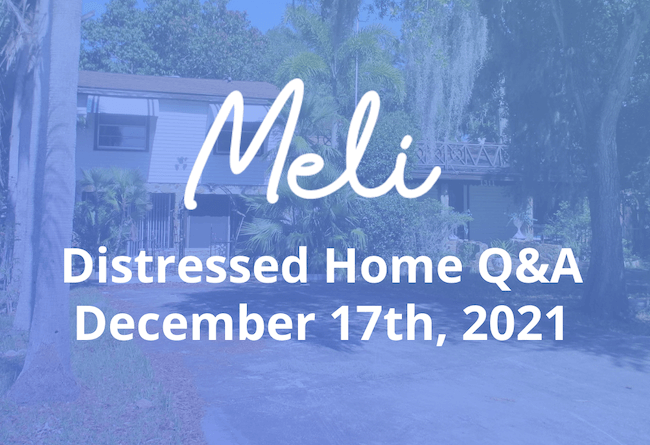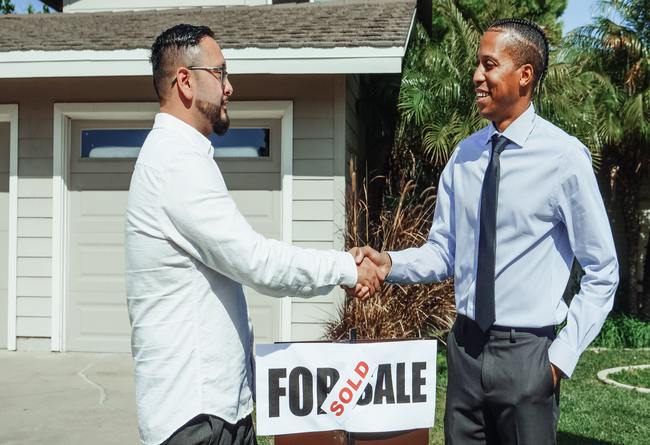For your ease, we have provided a transcript of the Q&A Recording.
Hey, this is Evan with Meli, home buyer, brokerage and consultant. We specialize in fixing title issues such as probate, liens, code violations, judgments, things of that nature. We’ll help you fix those issues, whether it be through making an offer on the property, brokering, or consulting.
We provide various services, so if you’re facing any of these issues, you can come to us. We can fix the probate issue and then either broker the house or make you an offer depending upon what your situation is. This is our monthly Q&A for the month of December. We’ll go through various questions that we have received and, let’s go ahead and get started.
1. What can Meli do for me?
Depending upon your situation, we can help you get through title issues or various issues with your house. Whether you’re looking to sell it or just fix the issues, we can be of help as a consultant, or as a broker or home buyer. We specialize in probates, title issues, disputes, judgments, liens, things of that nature. So if you have any of those types of situations, we can definitely help you.
2. What does it mean to sell a house to a cash homebuyer?
Simply put, it just means selling your house to an investor that’s going to pay in full for your property. Instead of selling a property to a retail buyer taking out a mortgage, you’re selling to an investor paying cash. The difference is that your property is going to have to be up to certain standards and conditions for the buyer of that property to be able to get a loan. Retail buyers will be unable to get a loan if the property is in a distressed situation. That’s really what it means, just selling to an investor that’s paying cash for your property, as-is, no contingencies.
Read More: What is a Cash Buyer in Property?
3. How can I sell my distressed house?
The easiest way is going online and looking for investors and homebuyers in your area that are actively buying properties. Then, find reputable companies with valid reviews. That will give you a good idea of the people you want to work with. Getting multiple offers from reputable companies is a good idea. Just because someone makes you an offer doesn’t mean they’re going to close. A lot of people make offers and they never close, and that’s a problem for the seller.
Read More: What Does “Distressed Property” Mean?
4. What’s the best way to sell a house that needs work?
Similar to the last question, the easiest way will be to look online and find the most reputable investors. Then, get offers from them and go with the most reputable offer combined with, hopefully, the highest purchase price. You’ll often find that the highest offer isn’t always a reputable investor. It’s likely someone that is actively trying to get properties under contract to try to resell them and if they close, great. But if they don’t close, they’ll just leave the seller hanging.
Read More: How to Sell a House That Needs Repairs
5. Is it possible to sell a house with a tax lien?
We’ve bought houses like that. It can be a problem. Most people won’t buy properties like that. We will buy properties with tax liens and code violation liens. It just depends on your situation. Tax liens are often paid before closing because they’re not that large, maybe $1,000 or up to $10,000 or $20,000. It’s not huge amounts, so a lot of times those will be paid at closing.
Read More: Can You Sell a House With a Lien on it?
6. How does probate work when you’re selling a house?
It can vary from case to case. Let’s say you had a relative pass away and you inherited the property. You’re going to have to take that property through probate. You can go ahead and get the house under contract. An investor can put it under contract while you’re going through probate, and you can feel very confident that the house is going to sell. Then you can take it through the probate process.
But, there are also companies like Meli; we will actually help you through the probate process. We have attorneys that we use because we do dozens and dozens of probates. And we’ll actually take the house through the probate process with you. We’ll handle all the work with our attorneys and just have you sign various documents that need to be signed. Then, we’ll go under contract with you on the property, and whenever the judge approves the sale of the property, we’ll move forward with the sale.
Some buyers will help you with the probate, some won’t. Some will want you to go ahead and do it, then when you’re through the process, they’ll close. So, it just depends on the buyer.
7. Can you sell a house before probate?
Technically, no, because you don’t own the property yet. In probate, the municipality and a judge determine whether you and other potential heirs are the rightful owners of the house. There can be a lot of disputes with inherited property. Someone may think they own the house, but they don’t, which I’ve seen before. The judge will determine who owns the house, and once they do, you will rightfully be able to sell it.
If you wanted to “sell the property before probate,” you would do what’s called a Quick Claim deed. With this, you technically aren’t really selling the house, you’re selling your interest in it. Technically, you have no interest before the probate, but it can be done and it’s a way to do it. You still have to take it through probate, but you technically can sell it before probate by selling your interest. When the judge says, “You’re the owner of this property,” I’ve already bought your ownership of the property before that point, so I’m the rightful owner. But that’s a different way of doing it. We would only do that in really complicated situations, but it’s not something that we have done very often. Typically, just going through the probate process correctly is the best way to go.
Read More: Selling a House in Probate in Florida
8. Is selling a house with code violations possible?
Of course. We buy houses with code violations and code violation liens. It’s not that difficult to do. You essentially have to do what’s called a Hold Harmless. This essentially says, “I know there’s code violations on this house, but I’m going to close on it anyway.” Then, the title company and the title insurance will say, “We do not insure this item and the buyer is aware that this item is here, and he takes all the risk.” We’ll absolutely do that.
A lot of times similar to the tax liens, you can pay them before closing, but not always. We’ve closed on properties with hundreds of thousands in code violation liens and had to clear those up after the fact and it took six or eight months to fix it. But, that’s part of what we do.
Read More: Can You Sell a House With Code Violations?
9. Can I sell my house to avoid foreclosure?
In theory, yes, assuming that you can sell it for a price that is equal to or more than the foreclosure amount. Let’s say you have a mortgage for $100,000, and the house is worth $200,000. We would come to you and say, “We’ll buy for $200,000.” Then at closing, we would pay off that mortgage and you would walk away with the other hundred. So, it’d be $200,000 minus $100,000 and that would get you out of foreclosure.
But if it’s, let’s say, the exact opposite scenario, where your house is worth $100,000, but you have a loan for $200,000. Then you have what’s called a Short Sale, and the bank would have to approve it. It’s a long process and complicated, but it’s doable. That would take some time to understand what you’re going through to see if we can help you.
Read More: Can You Sell Your House Before Foreclosure?
10. How can I resolve my home’s title issues?
I would recommend talking with an attorney and companies like Meli that have experience in title issues. We can walk you through what’s going on and see how difficult it is to figure out those title issues. In a lot of scenarios, we can fix them. Again, I recommend an attorney and speaking with a consultant of sorts, or a home buyer that’s experienced in title issues. Some homebuyers are, but not all of them are. That’s what we specialize in at Meli, so we could definitely help you with your situation.
Read More: How to Resolve Title Issues on Your Home
Wrapping Up
As always, thank you very much for listening to our Q&A. Our number is 407 305-5008. You can also go to our website, MeliHomes.com and answer a couple of questions. We’ll reach out to you to see if your property or situation’s a good fit and see if we can help.
Just to reiterate, Meli is a homebuyer, brokerage, and consultant in Central Florida. We take care of title issues, probate, liens, code violations, things of that nature. Feel free to give us a call or visit us on our website. Thanks, guys.
This article is meant for informational purposes only and is not intended to be construed as financial, tax, legal, real estate, insurance, or investment advice. Meli encourages you to reach out to an advisor regarding your own situation. Please consult with your advisor when making legal or financial decisions.






